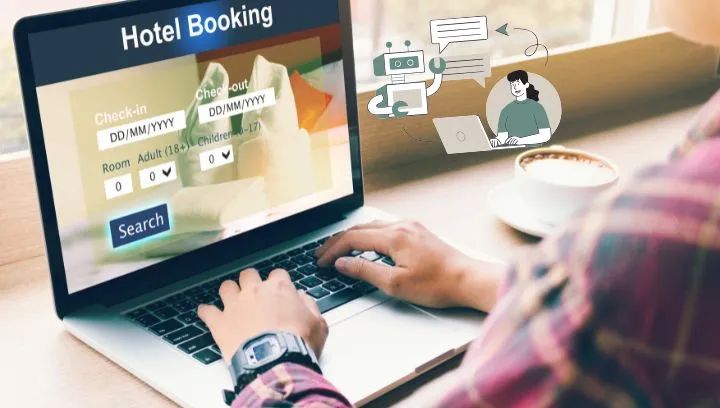Introduction:
Chatbots have revolutionized the way businesses handle booking and reservations processes by providing real-time assistance, automating tasks, and enhancing the overall customer experience. In this detailed guide, we will explore how chatbots can be effectively leveraged in booking and reservations, streamlining the process, and improving customer satisfaction.
For more insights on how chatbots are transforming customer support, check out our comprehensive guide on Transforming Customer Support.
Understanding Booking and Reservations Chatbots:
Booking and reservations chatbots are AI-powered conversational agents designed to handle the end-to-end process of booking services or making reservations. These chatbots interact with customers, collect necessary information, check availability, provide options, and facilitate the booking or reservation process.
Identifying Use Cases:
Before implementing a booking and reservations chatbot, it's essential to identify the specific use cases that align with your business requirements. Some common use cases for booking and reservations chatbots include:
- Hotel Reservations: Chatbots can assist customers in finding and booking hotel rooms, checking availability, providing pricing details, and facilitating the payment process.
- Flight Bookings: Chatbots can guide customers through the flight booking process, including searching for flights, selecting seats, and processing payments.
- Restaurant Reservations: Chatbots can handle restaurant table reservations, provide availability information, suggest suitable time slots, and send confirmation details.
- Car Rental Bookings: Chatbots can assist customers in renting cars by suggesting available vehicles, providing pricing and rental terms, and facilitating the reservation process.
- Event Ticketing: Chatbots can help customers book tickets for concerts, shows, or sporting events by providing event information, seating options, and ticket availability.
Designing Conversational Flows:
When designing chatbot conversations for booking and reservations, it's crucial to create clear and user-friendly conversational flows. Consider the following aspects:
- User Intent Recognition: Develop the chatbot's natural language understanding (NLU) capabilities to accurately interpret user intents related to booking and reservations.
- Availability Check: Enable the chatbot to check availability based on specified dates, times, or preferences, providing relevant options to the user.
- Recommendations and Filters: Incorporate recommendation engines and filtering options to present customers with suitable choices based on their preferences, budget, or specific requirements.
- Booking Details Collection: Gather necessary information from customers, such as dates, times, guest counts, preferred locations, and any specific requests.
- Payment Processing: Integrate secure payment gateways to enable customers to complete the booking or reservation process seamlessly within the chatbot interface.
- Confirmation and Notifications: Ensure the chatbot sends confirmation details to customers via email, SMS, or chat, including reservation/booking numbers, dates, times, and any relevant instructions.
Building and Training the Chatbot:
To build a booking and reservations chatbot, you can choose from various platforms and frameworks. Some popular options include:
- Dialogflow: Google's Dialogflow offers a user-friendly interface with built-in natural language processing (NLP) capabilities, making it easy to design and train chatbots.
- IBM Watson Assistant: IBM Watson Assistant provides advanced AI capabilities and allows businesses to create sophisticated chatbot applications.
- Microsoft Bot Framework: Microsoft Bot Framework enables the development of intelligent chatbots across multiple platforms and channels.
- Custom Development: For more complex requirements, you may choose to develop a custom chatbot using programming languages and frameworks such as PHP, Python, Node.js, or Java.
When training the chatbot:
- Prepare Training Data: Collect and annotate training data that includes a wide range of user queries and corresponding correct responses related to booking and reservations.
- Train the NLP Model: Use the training data to train the NLP model of your chatbot, enabling it to understand user intents and generate appropriate responses.
- Iterative Improvement: Continuously evaluate and refine the chatbot's performance by analyzing user interactions and incorporating user feedback.
Deployment and Integration:
Once the chatbot is built and trained, it's time to deploy it and integrate it into your booking and reservations process. Consider the following steps:
- Website Integration: Embed the chatbot widget on your website, allowing customers to access the booking and reservations functionality seamlessly.
- Messaging App Integration: Integrate the chatbot with messaging apps like Facebook Messenger or WhatsApp, providing customers with an additional channel for making bookings or reservations.
- API Integration: Connect the chatbot with relevant APIs of third-party platforms such as hotel booking systems, airline reservation systems, or restaurant management systems to retrieve real-time information and facilitate the booking process.
Monitoring and Optimization:
To ensure the chatbot is performing optimally and continuously improving, it's essential to monitor its usage and gather feedback. Consider the following practices:
- Analytics and Metrics: Track key metrics like conversion rates, customer satisfaction ratings, booking completion rates, and response times to evaluate the chatbot's impact on the booking and reservations process.
- User Feedback: Encourage customers to provide feedback on their experience with the chatbot, and use their insights to refine the chatbot's responses, recommendations, and conversational flows.
- Continuous Improvement: Regularly update the chatbot's knowledge base, training data, and conversational flows to adapt to changing customer needs, pricing, availability, and service offerings.
Conclusion:
Chatbots offer significant advantages in the booking and reservations process, providing real-time assistance, automating tasks, and enhancing customer satisfaction. By identifying relevant use cases, designing effective conversational flows, building and training the chatbot, integrating it into the booking and reservations ecosystem, and continuously monitoring and optimizing its performance, businesses can streamline the process, improve customer engagement, and drive bookings and reservations efficiently.




